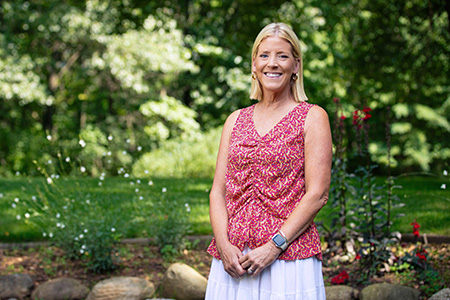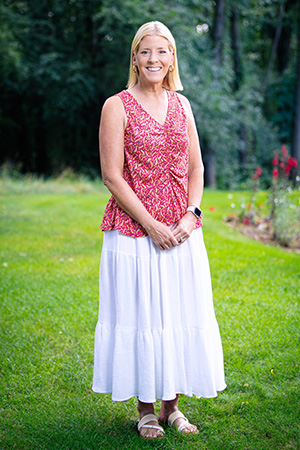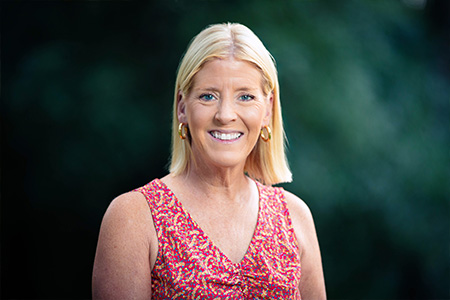Watch Karen's Story
After a stroke at just 55, Karen discovered that she also had atrial fibrillation. Thanks to the Henry Ford Jackson Hospital team, she got answers, a life-changing procedure and a second chance.
What started out as a normal day for Karen Dods quickly turned into an emergency.
 In June of 2022, Karen, then 55, had a stroke and was rushed to two different local hospitals for treatment. She recovered for two days, then returned to her home in Jackson—at least temporarily.
In June of 2022, Karen, then 55, had a stroke and was rushed to two different local hospitals for treatment. She recovered for two days, then returned to her home in Jackson—at least temporarily.
In the days following her stroke, Karen began having a strange feeling in her chest. She had experienced this feeling once in the past and had gotten it checked out, but the heart monitor didn’t reveal anything.
Karen discussed her symptoms with her daughter, who works in the medical field.
“She suggested I get an Apple Watch to test my heart,” Karen says. “My husband and I went together to the store the next day to get it. I tried it and it said I was in atrial fibrillation. We thought it might be a fluke, so he tried it, too, but his was normal.”
Karen’s husband drove her directly to the ER at Henry Ford Jackson Hospital, where the team confirmed that Karen had atrial fibrillation, or AFib, a heart rhythm disorder that affects the upper chambers of the heart. It’s a major risk factor for stroke.
She was referred to Matthew Jonovich, M.D., Henry Ford Health interventional cardiologist, who ordered several tests of Karen’s heart. This included a transesophageal echocardiogram (TEE), which revealed that Karen had a small hole in her heart, a congenital heart defect, another risk factor for stroke.
After a stroke at just 55, Karen discovered that she also had atrial fibrillation. Thanks to the Henry Ford Jackson Hospital team, she got answers, a life-changing procedure and a second chance.
The hole was small enough that it didn’t require surgery. Karen was referred to Bipin Ravindran, M.D., MPH, Henry Ford Health cardiac electrophysiologist, at the Henry Ford Jackson Hospital Atrial Fibrillation Clinic, to treat her AFib.
It was here that Karen first learned about cardiac ablation. This minimally invasive procedure uses radiofrequency energy or heat to intentionally and safely destroy a small amount of heart tissue that can produce the electrical signals that initiate and sustain an abnormal heart rhythm. In Karen’s case, the abnormal heart rhythm was atrial fibrillation.
 The purpose of an ablation procedure is to prevent atrial fibrillation from occurring—both to reduce the risk for stroke and to prevent the associated symptoms that can adversely affect quality of life.
The purpose of an ablation procedure is to prevent atrial fibrillation from occurring—both to reduce the risk for stroke and to prevent the associated symptoms that can adversely affect quality of life.
Because she was still recovering from her stroke, Karen couldn’t have an ablation procedure right away. Instead, and due to heart function that was lower than normal and the presence of abnormal heart arrhythmias, Dr. Ravindran put her on medicine to manage her heart rate. He also ordered a nuclear stress test to study the blood flow through Karen’s heart.
“I didn’t pass the stress test,” Karen says. “So, they also ordered a heart catheterization to look for any potential blockages.”
By this point, they were getting close to Karen’s planned ablation procedure date, and they wanted to avoid moving it, if possible.
“I appreciate how careful my team was, and how hard they worked to get me in for the heart cath far enough ahead of my ablation,” Karen says.
The heart cath checked out, and on August 22, 2022, Karen had her ablation procedure at Henry Ford Jackson Hospital.
“When I woke up, Dr. Ravindran showed me before-and-after images of my heart,” Karen says. “While he noted that it’s never a 100% guarantee for success for a procedure like this, he felt confident that it worked, and I left feeling very optimistic.”
After some periodic follow-up appointments with Dr. Ravindran, she now sees him once a year and continues to take a blood thinner to help reduce the risk of future strokes.
 One year after her stroke, Karen went on a three-week European vacation with her husband.
One year after her stroke, Karen went on a three-week European vacation with her husband.
“I was a little nervous to be far away from home,” she says. “What if I had an AFib episode in a different country? But Dr. Ravindran gave me the confidence that my heart was healthy, and not to worry about traveling.”
Three years after her procedure, Karen is free of symptoms and back to her active life, including walking, lifting weights, playing pickleball and golfing.
When she looks back on her treatment experience, Karen is thankful that she received such great care from the Henry Ford Jackson Hospital team.
“I’m so grateful for their know-how, compassion and kindness,” Karen says. “I birthed all three of my children at Henry Ford, and now I’ve been referring friends who need cardiology care. I couldn’t ask for a better team.”
We use cookies to improve your website experience. By using this site, you agree to our Terms of Use. Read our Internet Privacy Statement to learn what information we collect and how we use it.